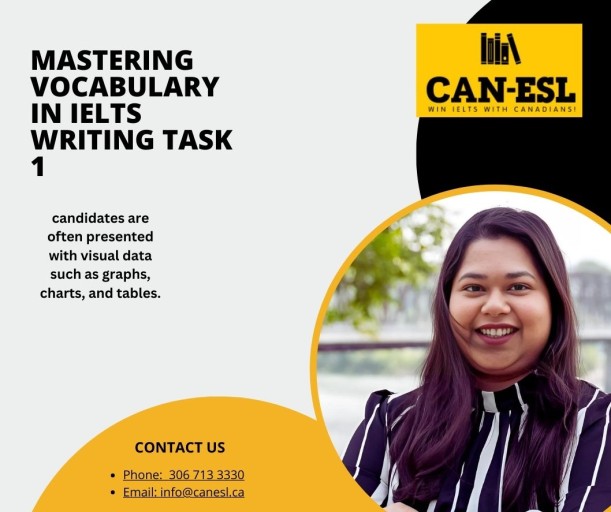

Mastering Vocabulary in IELTS Writing Task 1
The IELTS (International English Language Testing System)
Writing Task 1 presents a unique challenge for test-takers. This task requires
candidates to describe, summarize, or explain information presented in graphs,
charts, tables, and diagrams. One of the key components that can significantly
influence your score is vocabulary. A rich and precise vocabulary allows you to
convey information clearly and accurately, making your writing more effective.
In this blog post, we will explore strategies for mastering vocabulary
specifically for IELTS Writing Task 1.
Understanding the Task
Before delving into vocabulary, it's essential to grasp
the requirements of IELTS Writing Task 1. You will typically be given visual
data (like bar charts or pie charts) or a process diagram and asked to write a
report of at least 150 words. Your report should:
Key Vocabulary Categories
When preparing for IELTS Writing Task 1, it's beneficial
to familiarize yourself with several categories of vocabulary:
Building a Strong Vocabulary
1. Read Widely
One of the best ways to build vocabulary is through
reading. Engage with various materials, including newspapers, academic
journals, and reports. Pay particular attention to data descriptions in
articles that analyze statistics or present research findings. As you encounter
new words, take note of them and try to understand their context.
2. Practice with Sample Tasks
Regular practice with sample IELTS Writing Task 1 prompts
is crucial. After analyzing the data, write reports using newly acquired
vocabulary. Focus on using a range of descriptive, comparative, and
quantitative language. Over time, this practice will help solidify your
vocabulary in context.
3. Use Vocabulary Lists
Create themed vocabulary lists based on the types of
visuals commonly seen in IELTS tasks. For example, for bar charts, note words
related to increase, decrease, fluctuation, etc. Flashcards can also be
helpful; write a word on one side and its meaning or a sentence using it on the
other.
4. Learn Collocations
Collocations—words that often go together—can enhance
your writing. For instance, instead of saying "big increase," use
"significant increase." Recognizing common phrases will not only
improve your vocabulary but also make your writing sound more natural.
5. Synonyms and Paraphrasing
Using synonyms effectively is a vital skill in IELTS
Writing Task 1. Instead of repeating the same word, find alternatives that fit
the context. For example, instead of saying "increase" multiple
times, you might use "rise," "growth," or
"surge." This variation makes your writing more engaging and
demonstrates your vocabulary range.
Practical Strategies for Task 1
1. Analyze the Visuals
Before you start writing, take a few minutes to analyze
the visual data thoroughly. Identify key features, trends, and any anomalies.
Make brief notes on what stands out. This analysis will guide your vocabulary
choice when describing the information.
2. Organize Your Report
A well-structured report helps convey information
clearly. Typically, an IELTS Writing Task 1 report includes:
Use appropriate vocabulary for each section. The
introduction requires more general vocabulary, while the body should showcase
your descriptive and comparative language.
3. Use Appropriate Tense
Pay attention to the tense used in your report. Present
tense is typically used for current data, while past tense applies to
historical data. Using the correct tense not only demonstrates grammatical
accuracy but also impacts vocabulary choice.
4. Incorporate Visual Descriptions
When describing graphs or charts, use vocabulary that
helps readers visualize the data. For example, instead of saying "the
graph goes up," you might say, "the graph illustrates a steady
increase in the number of visitors." This not only enhances clarity but
also adds sophistication to your writing.
5. Be Objective
Avoid personal opinions or emotional language. Stick to
factual descriptions. Instead of saying, "I think the sales
increased," use "the data indicates a rise in sales." This
maintains the formal tone required in academic writing.
Reviewing and Editing
Once you’ve written your report, take the time to review
and edit it. Look for areas where you can improve your vocabulary. Are there
repetitive words you can replace with synonyms? Have you used a variety of
sentence structures? Editing is an essential part of the writing process that
can enhance your final product.
Utilizing Feedback
If possible, seek feedback on your writing from teachers
or peers who are familiar with the IELTS format. Constructive criticism can
highlight areas for improvement, particularly in vocabulary use.
Resources for Vocabulary Building
Mastering vocabulary for IELTS Writing Task 1 is a
crucial step towards achieving a high score. By building a strong vocabulary
foundation, practicing regularly, and employing effective strategies, you can
enhance your writing skills and communicate your analysis clearly and
accurately. Remember, the key is not just knowing a lot of words but using them
effectively in context. With dedication and consistent practice, you can master
the vocabulary necessary to excel in IELTS Writing Task 1. Good luck!